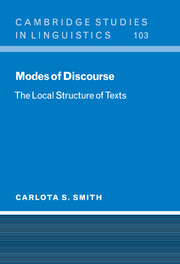Book contents
- Frontmatter
- Contents
- Preface
- Introduction
- PART I DISCOURSE STRUCTURE
- PART II LINGUISTIC ANALYSIS OF THE DISCOURSE MODES
- 4 Aspectual information: the entities introduced in discourse
- 5 Temporal and spatial progression
- 6 Referring expressions in discourse
- PART III SURFACE PRESENTATIONAL FACTORS
- PART IV DISCOURSE MODES AND THEIR CONTEXT
- Appendix A The Texts
- Appendix B Glossary
- References
- General index
- Index of names
5 - Temporal and spatial progression
Published online by Cambridge University Press: 18 June 2010
- Frontmatter
- Contents
- Preface
- Introduction
- PART I DISCOURSE STRUCTURE
- PART II LINGUISTIC ANALYSIS OF THE DISCOURSE MODES
- 4 Aspectual information: the entities introduced in discourse
- 5 Temporal and spatial progression
- 6 Referring expressions in discourse
- PART III SURFACE PRESENTATIONAL FACTORS
- PART IV DISCOURSE MODES AND THEIR CONTEXT
- Appendix A The Texts
- Appendix B Glossary
- References
- General index
- Index of names
Summary
Time and space are pervasive in human experience and in language; they are essential in understanding the Discourse Modes. Text progression depends on both domains. The temporal modes progress with changes in time and space, while the atemporal modes progress with metaphorical changes of location through the text domain. This chapter discusses text progression in the temporal modes; the atemporal modes are considered in Chapter 6.
The principles for temporal progression are essentially pragmatic, depending on inference about how situations are related to each other and to times. Tense is interpreted in three different patterns. After discussing progression in the modes, I provide the linguistic account that underlies the analysis, and implement it in Discourse Representation Theory. There is a distinct grammatical sub-system for talking about time in English, consisting of tense and time adverbials. The system is a closed one: choice of tense and type of adverbial is limited to a small set of alternatives. In contrast, spatial information is conveyed by lexical means that do not constitute a grammatical sub-system, except for a very few deictic adverbials.
Section 5.1 discusses temporal interpretation in the temporal discourse modes; 5.2 introduces the sub-system of temporal location in English; 5.3 implements the interpretations in Discourse Representation Structures; 5.4 discusses space, and how it differs in linguistic expression from the temporal domain; 5.5 gives the forms and linguistic features of the temporal location sub-system.
- Type
- Chapter
- Information
- Modes of DiscourseThe Local Structure of Texts, pp. 92 - 122Publisher: Cambridge University PressPrint publication year: 2003



